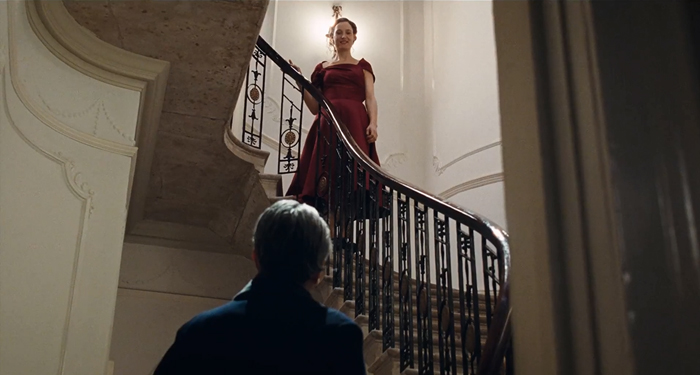Reviewed by GREG KING
Director: Paul Thomas Anderson
Stars: Daniel Day-Lewis, Vicky Krieps, Lesley Manville.

Phantom Thread is the eighth film from revered filmmaker Paul Thomas Anderson (Boogie Nights, Magnolia, The Master, etc), and it reunites him with Daniel Day-Lewis, whom he directed to an Oscar in There Will Be Blood. Anderson’s films have always been meticulous in their construction, even though some, like Inherent Vice, have left audiences cold and perplexed as they have become increasingly incoherent and indulgent. And Anderson doesn’t repeat himself – his films have looked at the beginnings of the porn industry, a charismatic but dangerous cult leader, a private eye tale, and even an unusual love story with Punch Drunk Love. Phantom Thread is again full of his usual off kilter sensibilities and oddball characters, and while it is handled with uncharacteristic restraint it is also elusive and not as immediately accessible as some of his earlier films.
Day-Lewis plays Reynolds Woodcock, a taciturn but revered fashion designer in post WWII London. He is meticulous in his work as he painstakingly designs dresses for London’s upper classes, movie stars and royalty. He is obsessed with his routines – woe betide anyone who disturbs his breakfast – and also rigorously guards his privacy. A confirmed bachelor he has regularly drawn inspiration and companionship from a number of women although he has always resisted becoming too attached. Then during a sojourn at his country house, he meets bashful waitress Alma (Vicky Krieps, a largely unknown actress from Luxembourg), who becomes his latest muse. But when the outspoken and confident Alma also becomes his lover she turns his orderly world upside down, and the balance of power in the relationship subtly changes.
Phantom Thread is not a plot driven film, but a psychological drama that creates a certain mood as it explores the complex relationship between Woodcock and Alma, two obsessive personalities. Plot threads quickly disappear as Anderson defies traditional narrative structures. An ominous tone pervades some quietly unsettling scenes, and one meal is filled with menacing undertones. The film explores themes of obsession, manipulation, masculinity, love, the creative process, power and deceit. As most of the drama is confined to the interior of Woodcock’s home, Anderson imbues the material with an almost stifling and claustrophobic atmosphere.
Anderson also seems to be paying homage to some of his filmmaking heroes here, in particular Kubrick and Hitchcock, and the film does recall the 1940 classic Rebecca, with its icy and detached emotional approach, ominous overtones and visual aesthetic. The film is visually quite stunning, with the precise and pristine cinematography from Anderson himself, a perfectionist who uses long static takes and wide shots, often shooting characters through doorways. The attention to period detail is meticulous and the costumes from Mark Bridges are stunning. However, Anderson’s pacing is measured, almost glacial at times, and the lack of action here may frustrate many.
Day-Lewis has announced that this will be his final film as he is retiring from acting, although he previously retired to work as a cobbler in Italy, so we will take this announcement with a grain of salt at the moment. He plays the middle-aged Woodcock with an icy demeanour, his cold and detached performance matching the tightly wound character’s aloof, prickly and intense nature and volatile mood. But he also suffuses this initially unlikeable character with unexpected touches of vulnerability. In her most substantial role to date Krieps brings a defiant quality and strength to her performance. Lesley Manville comes close to stealing the film with her waspish performance as Woodcock’s quietly controlling, resilient and domineering sister and formidable business partner Cyril, who oversees the daily running of the iconic House of Woodcock.
Phantom Thread has been garnering positive reviews, but it is a mysterious and oblique film that will prove divisive for the more casual filmgoer who will be left wondering what it was all about or indeed what the fuss is about. It is undeniably glossy and sumptuous on the surface but is not as thought-provoking, emotionally engaging or as insightful as some of Anderson’s best films.
★★★☆



